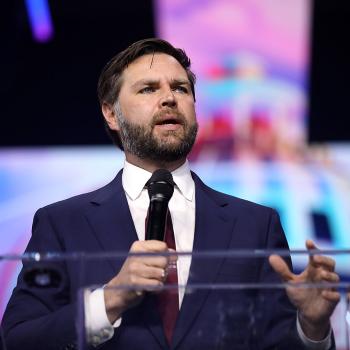President Bush's first meeting with Pope John Paul II, at Castel Gandolfo, took place at the same time as he was addressing the stem cell issue. It shaped his thought. Justice was at the center. It was not coincidental that it grew from the President's Christianity. But also it's directly related to this Evangelical-Catholic sensibility that I think applies very uniquely among the contemporary presidents to George W. Bush.
The catch phrase, when President Bush first came to office in 2000, was "compassionate conservatism." Do you think President Bush lived that out?
In my present role with Focus on the Family, I had to be up in South Africa earlier this year. Everywhere I went, whether for business meetings or ministry meetings, I was amazed at how highly regarded George W. Bush is in Africa. That's a direct result of his compassionate conservatism and his historic work battling AIDS and malaria there. The President's PEPFAR initiative against AIDS, and his anti-malarial program, stand among his most significant foreign policy achievements, and yet they're little known or appreciated now, at least in the United States. I hope they will be recognized over time.
It's worth revisiting what the President said when he spoke, in his first inaugural address, about the parable that Jesus told of the road to Jericho. The meaning of compassion stands at the very heart of that parable. The Priest and the Levite walk directly past the man who's been injured and stripped naked. The Good Samaritan crosses the highway to help the man and pays for his care. Jesus says that the Good Samaritan had "compassion" on the injured man. We understand that in Christian scripture as having true mercy.
This is what George W. Bush meant by compassionate conservatism. It's not that the federal government was going to come in and supply every need. Just the opposite. When George W. Bush gave one of the most important speeches of his Presidency, at Notre Dame, he was specifically countering Lyndon Johnson's notion of the Great Society. What George W. Bush wanted to do was not to continue to insert a wasteful big government into programs and projects that don't work. What he wanted to do, and what was at the heart of compassionate conservatism, was to advance mercy and compassion by removing an institutional bigotry within the federal bureaucracy against faith-based programs that were turned away just because they were faith-based. George W. Bush made clear that the federal government was not going to buy the Bibles or the crucifixes, but they could further the good work that these faith-based organizations were doing.
And he was right. The private sector, the intermediary institution, the concept of subsidiarity, these were so important to President Bush. He believed in this mission, believed that faith-based groups were often addressing social ills more compassionately and more effectively than the government could do. Removing the institutional bigotry against faith-based programs was exactly the right thing to do.
So "compassionate conservatism" wasn't just a campaign slogan to get him elected?
George W. Bush was sincerely one of the most compassionate people I've ever met. I saw this on multiple occasions. He treated the lowest staffer with the same respect he did a king, a queen, or a pope or prime minister. This was a direct result of his faith.
As you know, the first chapter of The Man in the Middle is about the grace and mercy and compassion he showed to me in a way that was very personal and, in the political classes, rather unparalleled. When you embarrass the president, the vice president, or the like, you immediately become persona non grata. They need to hold you at a great distance. You're simply not invited to the White House and extended grace and compassion in the way the President did to me.
What I'm saying is, George W. Bush's faith shaped not only his foreign and domestic policies but also the very basic ways in which he treated people. He had this gift and ability to connect with real people regardless of their station in life. It was indeed a very compassionate conservatism that he represented.
What do you say to those who assert that "compassionate conservatism" was code for "big-government conservatism"?
George W. Bush never spoke in code. George W. Bush is that rare politician—and I have worked in Washington for nearly twenty-five years, I've walked with the princes of this world—he is that rare politician who is the same in private as in public. He says what he means and means what he says.
Compassionate conservatism was not a euphemism or code. It represented, and represents, precisely who he was and is, as a result of his faith. It really was dramatized in George W. Bush's visit (when he was Governor) to a prison in Texas where Chuck Colson and Prison Fellowship had become very active. The President saw the results of their ministry, and the way that their work was impacting these otherwise-very-hardened criminals. A seed was planted. George W. Bush came to see that there was an absolutely critical role for faith-based and community groups. They were the "little platoons" doing the most important work. He resolved that when he came to the Oval Office, he would take that model or paradigm and apply it nationally.





